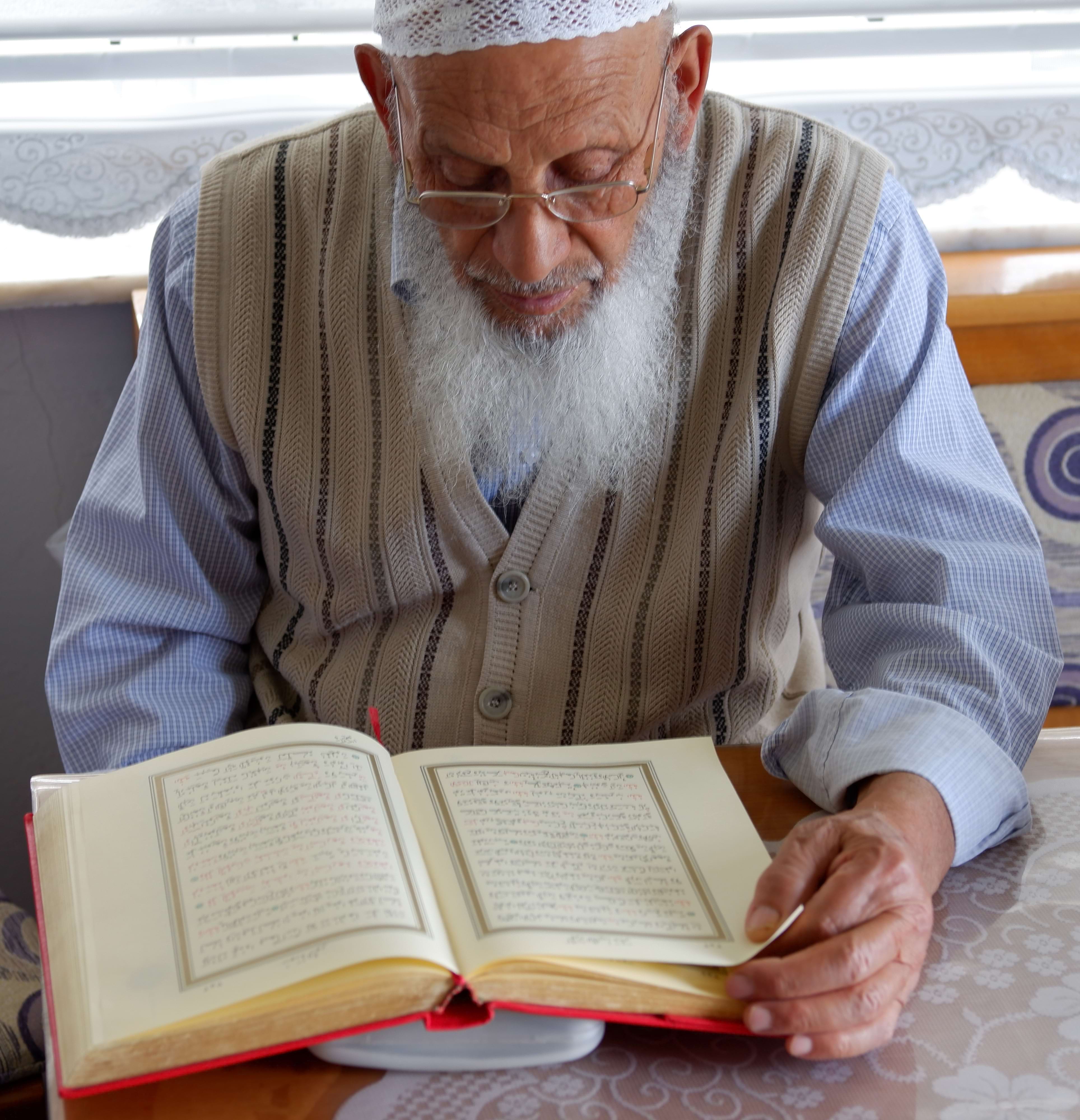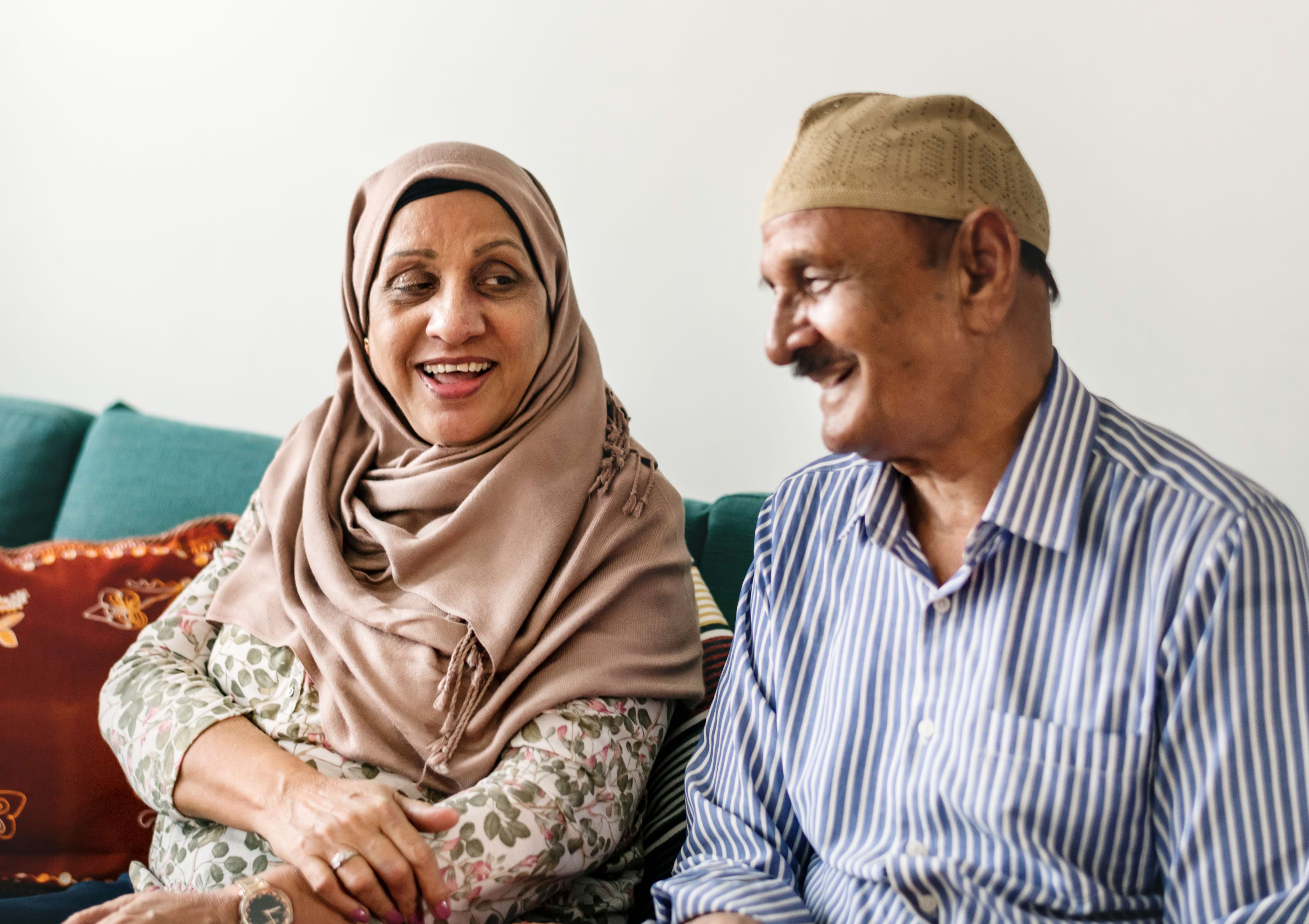Memory Care Guide for Muslim Seniors
Reviewed by: Dr. Brindusa Vanta, MD
In the Islamic culture, family is at the heart of everything. This reflects in the cultural challenges to finding solutions for aging Muslims who may require more care than families can provide. As cognitive decline advances, seniors may lose their ability to remain independent safely. Six out of 10 people with dementia exhibit wandering behaviors, which can be dangerous as seniors lose their ability to recognize familiar places and faces. Seniors may show signs of impaired judgment around the home, such as forgetting that the oven is on, not locking the door at night, or being unable to take their medication safely and reliably.
It's hard for anyone to place their parents into a memory care facility or other retirement community, but in the Muslim community, caring for parents and other aging family members is deeply ingrained. It's a wonderful practice, but sometimes it can feel like too much. If you feel you need help with your aging relatives, you aren't alone, and there are ways to ensure your values don't clash with the care that your family members may need.
This guide provides you with information you may need if you're considering placing your aging Muslim relative into a long-term care facility, including how to balance culture with care and how to find a facility that will be a good match. It also includes a list of resources for Muslim seniors that may be helpful during your search.
The Islamic Perspective on Aging and Care for Seniors
The Islamic perspective on aging calls for children to be responsible for their parents. Those who were young grow old enough to stand on their own feet, and those who carried them through their youth deserve dignity and reverence in their elder years. This is taught to children by their parents with the expectation that once they are grown, they will then care for their parents as a God-given duty.
This can often make it difficult for Muslim families when they face conditions they are not equipped to handle on their own. Whether your loved one has Alzheimer's disease or another medical condition that requires skilled care that you or your family cannot provide, it can be tough to admit that, though you were raised to care for your loved one, you can't. It can feel like defeat or a failure to place them into a facility designed to care for them. However, sometimes, the kindest thing you can do that shows them the most respect and reverence is to place them somewhere where they'll get the care they need the most.
Barriers Muslim Seniors Face When Seeking Memory Care

As seniors age, it's natural for them to need more care, with those over the age of 65 having a nearly 70% chance of requiring some sort of long-term care services. When that care becomes too much, it's also normal for families to seek help through care designed to support their loved ones, such as memory care communities. For most people in the United States, this isn't a problem. Their needs are met, their culture is honored and they are happily surrounded by people like themselves.
However, it's not so simple for Muslims seeking assistance for their loved ones. Much of their religious beliefs and practices don't align neatly with what's deemed customary in the U.S., and as a result, most long-term care facilities aren't fully equipped to accommodate Muslim seniors. Moreover, even if they are happy to accommodate, seniors can feel isolated without ties to their community and religion. When just 1.1% of the U.S. population is estimated to practice Islam, there's little demand for retirement communities focused on the Islamic culture, which can result in several barriers Muslims face that aren't an issue for most of the aging population.
Dietary Needs
Muslims often practice a much stricter diet than most people in the U.S. While it is becoming more common for communities to provide options for Kosher foods to Jewish residents, vegetarian and vegan options, and other medically necessary dietary accommodations, Halal foods aren't often given the same consideration. It's not unheard of for Muslims to be told to choose the Kosher options, which can sometimes be acceptable.
This can make seniors feel unwanted or unimportant, which can worsen their experience in a memory care community and also be a source of guilt for their families.
Access to Worship Services and Religious Activities
While it's relatively common to find worship services for Christians in memory care environments, other religions are rarely given the same attention. Since requiring care in a memory care community often prevents seniors from driving for their own safety, this can cause a complete severance from their connection to their religious affiliation. For seniors who have spent their lives keeping with Islamic values and practices, such as timed prayers and visits to mosques, this can be distressing.
If your loved one has Alzheimer's disease or another form of cognitive decline, they may no longer be required to follow Ramadan and other practices. However, access to these religious festivals and cultural traditions is still important for their mental well-being.
Cultural Insensitivity
Muslim families may also worry about cultural insensitivity while their loved ones receive care. In part, this can overlap with a lack of Halal foods provided or a misunderstanding of the importance of prayer and other forms of religious worship.
Another major concern can be modesty, especially if your loved one is a woman. Having caregivers the same sex as your loved one may be important to you, or having chaperones when an opposite-sex caregiver is required. This is understandable, and neither you nor your loved one should have to worry about caregivers respecting modesty and other religious practices.
These concerns can create a major barrier when seeking care for your senior loved one that may not be easily solved if you do not have access to a long-term care facility well-versed in care for Muslim residents.
Discrimination
Beyond cultural ignorance or insensitivity, the fear of discrimination and racism can also pose a dangerous problem. Every person deserves respect and dignity, and if you live in an area with little Islamic presence, you may be worried about discrimination in your loved one's care. Even if they receive all necessary medical care, being surrounded by discrimination is still harmful.
A Lack of Demand for Faith-Based Care
All the above factors culminate in a lack of demand for Islamic long-term care. Muslim families prefer to keep their loved ones home as long as possible, and because of a lack of demand, the problem never gets solved. It's not economical for many long-term care facilities, such as memory care communities, to put in the resources for a program that will not be in demand. Unfortunately, this also makes these communities less of an option, even for those who may feel overburdened with the extent of care their loved one needs.
Dealing With the Cultural Guilt of Moving a Loved One to Memory Care
If you make the difficult decision to place your loved one into memory care, first, remember that you aren't alone. It's still considered unthinkable by many practicing Muslims to place their parents or other loved ones into a home, but sometimes, it's the best option you can make for everyone. Of course, that doesn't mean there isn't guilt associated with it. What's important is that you come to peace with your decision and trust that you're making the right choice for your loved one.
Remember You Are Making This Decision Out of Love for Your Senior
Choosing to move your senior loved one into a memory care facility is one of the kindest things you can do for them if you can't care for them yourself. You may face backlash from others who can't believe you'd put your loved one in a long-term care home, but remember that they aren't in your shoes. They don't see the struggles you and your senior loved one may be facing.
Especially if your loved one has Alzheimer's disease, it can be difficult to help them as it progresses and they become dangerous to themselves without supervision. They may require around-the-clock care that you and your family can't provide. Receiving care in an environment specifically designed with their condition in mind can be the difference between them having a safe place to call home and an accident.
This isn't an easy decision, but it's one made with love and compassion. When you feel guilty, let that knowledge guide you and help you stay true to your decision.
Give it Time
Moving your loved one into memory care is a big change and will require an adjustment period for everyone involved, which takes time. If you move your loved one into a community, don’t make a decision on whether it was the right or wrong choice until everyone has been able to settle into their new normal. During this time, find new ways to create routines that keep you involved with your loved one, such as implementing regular time to chat together on the phone to help make the distance feel a little smaller. Over time, you may find that the guilt fades away, especially if your loved one begins to settle and thrive in their new home as they receive the care they need.
Visit Your Loved One Often
Unless you place your loved one in a community far from you, you can still visit and spend time with them regularly. You aren't abandoning them somewhere all alone. Enjoy the time you get with them instead of spending all your time worrying about their care and whether they'll be okay.
What to Look For in a Memory Care Community for Muslim Seniors

Looking for a memory care community can be overwhelming. As you tour and consider various options, remember these points to help make decisions. Keep notes about each community you tour so you can decide which will best meet your loved one's needs.
- Halal Dining Options: It is often difficult to find communities that offer Halal dining options, but it's still worth asking about as you tour. If Halal options aren't available, ask how your loved one's dietary requirements would be accommodated.
- Religious Accommodations: Some communities offer religious accommodations, such as transportation to places of worship. Ask about policies surrounding Islamic worship practices and how they may be accommodated.
- Anti-Discrimination Policies: While most, if not all, facilities will have some anti-discrimination policies in place, it can be a good idea to discuss and review them to determine if they are a good fit and will protect your loved one, as well as what the recourse will be they do experience discrimination.
- Staff-to-Resident Ratio: Memory care communities have regulations surrounding staff-to-resident ratios that they must follow. However, meeting the bare minimum required by the state may still be stretching workers too far. Choosing locations with lower staff-to-resident ratios can improve the care your loved one receives.
- Staff Training: Memory care staff is often trained in providing care specific to dementia and Alzheimer's patients. If your loved one requires memory care, discuss the training programs and licensing caregivers must complete, and opt for communities where the staff is highly trained and competent.
- Health and Wellness Services: Memory care often provides several health and wellness services, such as therapies or gyms. They may also offer programs with on-site health care providers that can be attractive when selecting a community for your loved one.
- Amenities Provided: Many communities have various amenities. Some will include private rooms and bathrooms, while others may offer full apartment suites with kitchenettes, though memory care units typically don't provide cooking appliances for safety reasons. Other common amenities offered include housekeeping, laundry services, courtyards and social outings and activities.
- Costs: Prices can vary widely for memory care communities to account for increased levels of care. Depending on the care needed, you may want to consider home health care or in-home care, which may be more affordable than memory care in some locations.
Resources for Muslim Seniors
While a myriad of resources are available for the general senior population to assist with paying for long-term care, such as Medicare and Medicaid, few resources exist specifically to assist aging Muslims. These resources provide assistance with issues such as discrimination and difficulty finding a health care provider with shared religious values who will understand their cultural norms.
| resource | contact | description |
|---|---|---|
| National Consumer Voice for Quality Long-Term Care | See the website for local contact information | Long-term care ombudsmen can assist seniors with complaints about their long-term care facilities, such as not having their rights respected, being mistreated, being cared for improperly or reports about violations of state regulations. They can also assist with directing seniors and their families to facilities that may meet their needs. |
| Islamic Social Services Association, USA | (888) 415-9920 info@issausa.org Online form | This organization collects social services resources, both nationally and locally, that may be of use to Muslims. These include both US and international directories of care providers, as well as access to state-specific resources. It also provides webinars and informational materials. |
| Muslim Legal Fund of America | (972) 331-9021 info@mlfa.org | The Muslim Legal Fund of America provides federal-level legal representation for certain cases surrounding religious discrimination. They prioritize cases deemed to have a significant potential impact on civil rights and liberties. They also provide a wealth of civil rights resources surrounding religious freedom. |
| American Muslim Health Professionals | Online form contact@amhp.us | American Muslim Health Professionals provides a national directory of Muslim-run free clinics that may assist Muslim seniors in locating free or low-cost health care provided by someone who understands their religion. |
| Institute for Muslim Mental Health | (800) 273-8255 mail@muslimmentalhealth.com | The Institute for Muslim Mental Health seeks to match Muslims needing mental health care with access to high-quality counselors who understand the Islamic perspective. To be matched with a trained counselor, seniors can contact the listed phone number 24/7. |


